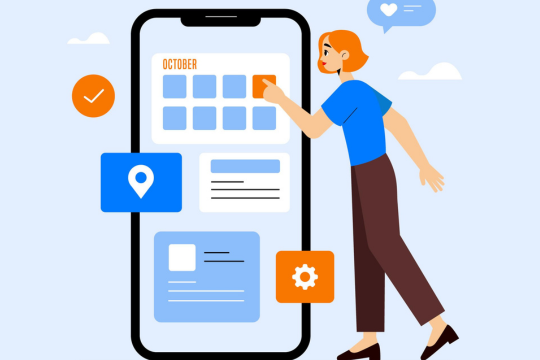What is Application Development and Emerging Technologies
The phrases "application development" and "emerging technologies" are at the forefront of innovation and corporate transformation in the current fast-paced digital era. Knowing these ideas is essential to being knowledgeable and competitive, whether you're a tech enthusiast, aspiring developer, or business owner. At Webmaa, we are committed to providing people and businesses with comprehensive knowledge that connects technology to real-world applications. We will examine the foundations of application development in this extensive blog, as well as talk about the most exciting new technologies that are changing the digital landscape.
Table of contents [Show]
- 1 What is Application Development?
- 1. 1 Why is application development important?
- 1. 2 What Are Emerging Technologies?
- 1. 3 The Intersection of Application Development and Emerging Technologies
- 1. 4 Future Trends in Application Development
- 1. 5 Challenges in Application Development
- 1. 6 Why Learn Application Development Now?
- 1. 7 Final Thoughts:
What is Application Development?
The process of planning, developing, testing, and implementing software applications to carry out certain activities or address specific issues is known as application development. Mobile devices, desktop PCs, web browsers, and cloud environments are just a few of the platforms on which these apps can operate.
Application development typically involves:
Requirement Analysis: Determining the company goals and user needs.
Design: Developing the application's architecture, wireframes, and mockups.
Coding: Writing source code using programming languages like Java, Python, Swift, or JavaScript.
Testing: Making sure the program is error-free and functions as planned.
Deployment: Starting the program on the proper platform.
Maintenance: Making gradual updates and enhancements to the software in response to user input.
There exist various forms of application development:
Web Application Development: Applications that run in a web browser via HTML, CSS, and JavaScript.
Mobile Application Development: Applications that run on smartphones and tablets based on Android and iOS platforms.
Desktop Application Development: Applications that run on personal computers.
Cloud-based Application Development: Cloud-based apps hosted on cloud platforms such as AWS, Azure, or Google Cloud.
Enterprise Application Development: Business-critical applications that organizations utilize to execute internal and external operations.

Why is application development important?
With every industry touched by digital transformation,application developmenthas become indispensable. Here's why:
- Business Efficiency: Automates processes and enhances productivity.
- Customer Engagement: Improves user experience and satisfaction.
- Data-Driven Decisions: Collects and analyzes data for improved decision-making.
- Competitive Advantage: Keeps companies ahead of the curve by embracing innovative solutions.
Key Stages in the Application Development Lifecycle (ADLC)
- Planning: Establish goals, scope, and resources.
- Analysis: Discover user needs and business needs.
- Design: Create architecture and UI/UX.
- Implementation: Code the app.
- Testing: Find and correct bugs.
- Deployment: Release the app to users.
- Maintenance: Offer updates, upgrades, and support.
New development approaches such as Agile and DevOps have further optimized this process by allowing continuous integration and delivery (CI/CD).
What Are Emerging Technologies?
Emerging technologies are those advanced innovations that are in the process of being developed or that have the potential to make a real impact on the future of industries and societies. They tend to disrupt conventional processes and build new markets or redefine existing ones.
Below are some major emerging technologies transforming application development:
- Artificial Intelligence (AI) and Machine Learning (ML)
From customized suggestions to smart chatbots and predictive analytics, AI enables smarter, more responsive apps. - Blockchain
Beyond cryptocurrency, it's central to secure transactions, smart contracts, and decentralized applications (dApps). - Internet of Things (IoT)
IoT connects devices to the internet, powering apps for smart homes, healthcare, and industrial automation. - Augmented Reality (AR) and Virtual Reality (VR)
Integrated into apps for immersive experiences in gaming, education, retail, and real estate. - 5G Technology
Offers high speed and low latency, enhancing mobile apps, especially those involving real-time communication and streaming. - Edge Computing
Brings data processing closer to the source, essential for real-time apps like autonomous vehicles and smart sensors. - Quantum Computing
Still evolving but will solve complex problems in cryptography, AI, and logistics beyond the capacity of traditional computers. - Low-Code/No-Code Development
Allows users to build apps with minimal coding, accelerating development and expanding innovation opportunities.
The Intersection of Application Development and Emerging Technologies
Emerging tech accelerates and transforms how apps are built and used. For example:
- AI-powered tools (e.g., GitHub Copilot) assist in coding.
- Blockchain ensures app security and immutability.
- IoT integration allows apps to interact with smart devices.
- Low-code platforms let non-tech users build powerful apps.
Future Trends in Application Development
- Progressive Web Apps (PWAs): Function smoothly on all devices with native app-like UX.
- Cross-Platform Development: Tools like Flutter and React Native support both iOS and Android from one codebase.
- Microservices Architecture: Breaks apps into smaller, manageable services for better scalability.
- Cloud-Native Development: Built specifically for the cloud for flexibility and scale.
- Voice-Activated Interfaces: Integrates with assistants like Alexa and Google Assistant.
- Elevated Security Features: Growing importance of cybersecurity demands advanced app security.
Challenges in Application Development
Despite advancements, developers face key challenges:
- Security & Privacy: Protecting user data is critical.
- Integration Challenges: Ensuring compatibility with existing systems.
- Performance Optimization: Ensuring smooth app performance across devices and networks.
- User Expectations: Meeting high standards for UI/UX and functionality.
Why Learn Application Development Now?
Learning app development unlocks diverse career opportunities. Whether it's mobile apps, AI-based solutions, or cloud platforms, the demand for skilled developers is rising.

Final Thoughts:
Application development, in tandem with emerging technologies, is redefining how we engage with the digital world. From enhancing user experience to solving complex problems, it drives innovation across industries.
At Webmaa, we encourage you to stay ahead by learning and adapting to these dynamic changes. With knowledge of both fundamentals and emerging tech, you can lead the digital revolution.
Whether you're a tech enthusiast, developer, or entrepreneur, now is the time to embrace these trends and turn your ideas into impactful digital solutions.
Join Webmaa for more tutorials, insights, and resources to guide your digital journey.
